- Home
- P. D. James
Unnatural Causes Page 6
Unnatural Causes Read online
Page 6
Had she loved him, she wondered. It was difficult to remember. Perhaps not. Perhaps it had never been love as she imagined love to be. But it had been as close as she would ever get to that longed-for, elusive, oft-imagined cataclysm. She had dealt with its counterfeit in nearly forty novels; but the coin itself had never come within her grasp.
Sitting in front of the dead fire she recalled the second when she had known the truth, and her cheeks burnt at the memory. Suddenly he had begun to cry, awkwardly as a child. In that moment all artifice had been forgotten. Only pity remained. She had knelt beside him, cradling his head in her arms, murmuring her comfort and love. And then, it had happened. His whole body stiffened and withdrew. He looked at her, catching his breath, and she saw his face. It was all there. Pity, embarrassment, a trace of fear and—hardest of all to accept—physical repulsion. In one bitter moment of complete clarity she had seen herself with his eyes. He had been grieving for that slim, gay, beautiful creature; and an ugly middle-aged woman had chosen that moment to throw herself into his arms. He had recovered himself, of course. Nothing had been said. Even the dreadful sobbing had been cut off in mid-gasp like that of a child suddenly offered a sweet. She reflected bitterly that there was nothing like personal danger to take the edge off grief. Somehow, gracelessly, she had stumbled back to her own chair, her face burning. He had stayed for as long as politeness dictated and she had handed him his drinks, listened to his sentimental reminiscences about his wife—dear God, had the poor fool forgotten so soon?—and feigned interest in his plans for a long holiday abroad, “to try to forget.” It was six months before he had thought it prudent to revisit Rosemary Cottage alone and even longer before he began tentatively to establish the understanding that she would be available whenever he wanted to escort a woman in public. Just before he left for his holiday he had written to tell her that she was named in his will “in appreciation of her sympathy and understanding on the death of my dear wife.” She had understood all right. It was the kind of crude, insensitive gesture which he would consider an adequate, appropriate apology. But her first reaction hadn’t been anger or humiliation; she had merely wondered how much it would be. Since then she had wondered increasingly, and now the question had a fascinating immediacy. It might, of course, be a mere hundred or so. It might be thousands. It might even be a fortune. After all, Dorothy was reputed to have been a wealthy woman and Maurice hadn’t anyone else to leave it to. He had never had much use for his half-brother and lately they had grown even further apart. Besides, didn’t he owe it to her?
A slant of light from the hall fell across the carpet. Silently, Elizabeth Marley came into the room, her feet bare, her red dressing gown glowing in the half-light. She stretched herself out stiffly in the chair opposite her aunt, her feet towards the dying fire, her face deep in the shadows. She said: “I thought I heard you come in. Can I get you anything? Hot milk? Ovaltine?”
The tone was ungracious, embarrassed, but the offer was unexpected and Miss Calthrop was touched.
“No thank you, dear. You go back to bed. You’ll catch cold. I’ll make the drink and bring yours up.”
The girl did not move. Miss Calthrop made a fresh attack on the fire. This time a tongue of flame hissed round the coals and she felt the first welcome warmth on hands and face. She asked: “You got Sylvia home all right? How did she seem?”
“Not too good. But then, she never does.”
Her aunt said: “I wondered afterwards whether we ought to have insisted that she stay here. She really looked very ill, not safe to be alone.”
Elizabeth shrugged. “I did tell her that we had a spare bed until the new au pair girl comes and that she was welcome to it. She wouldn’t consider it. When I pressed her she became overwrought, so I left it. After all, she’s thirty, isn’t she? She’s not a child. I couldn’t force her to stay.”
“No, of course not.” Celia Calthrop thought that her niece would hardly have welcomed Sylvia in the house. She had noticed that most women were less sympathetic to the girl than were men, and Elizabeth made no secret of her dislike. The voice from the armchair asked: “What happened after we left?”
“Nothing very much. Jane Dalgleish seems to think that he may have been killed with her chopper. Apparently she missed it about three months ago.”
“Did Inspector Reckless tell you that he was killed that way?”
“No. But surely …”
“Then we still don’t know how he died. He could have been killed in a dozen different ways and his hands chopped off after death. I imagine that they were. It wouldn’t be an easy thing to do if your victim were alive and conscious. Inspector Reckless must know if it happened that way. There wouldn’t be very much bleeding for one thing. And I expect he knows the time of death to an hour or so even without the PM report.”
Her aunt said: “Surely he died on Tuesday night? Something must have happened to him on Tuesday. Maurice would never walk out of his club like that and spend the night away without a word to anyone. He died on Tuesday night when Sylvia and I were at the pictures.”
She spoke with stubborn confidence. She wished it to be so, therefore, it must be so. Maurice had died on Tuesday night and her alibi was assured. She added: “It’s unfortunate for Justin and Oliver that they happened to be in town that evening. They’ve got alibis of a sort, of course. But it’s a pity all the same.”
The girl said quietly: “I was in London on Tuesday night too.” Before her aunt could speak she went on quickly: “All right, I know what you’re going to say. I was supposed to be on a bed of sickness in Cambridge. Well, they let me up earlier than I told you. I took the first fast train to Liverpool Street on Tuesday morning. I was meeting someone there for lunch. No one you know. Someone from Cambridge. He’s gone down now. Anyway he didn’t turn up. There was a message of course, very polite, very regretful. It’s a pity, though, that we arranged to meet where we were known. I didn’t much enjoy seeing the head waiter look sorry for me. Not that I was surprised really. It isn’t important. But I wasn’t going to have Oliver and Justin gossiping over my affairs. I don’t see why I should tell Reckless, either. Let him find out for himself.”
Celia thought: “But you told me!” She felt a surge of happiness so acute that she was glad that they sat in the shadows. This was the first real confidence she had ever received from the girl. And happiness made her wise. Resisting the first impulse to comfort or question she said: “I’m not sure, dear, that it was sensible of you to spend the whole day in town. You’re not really strong yet. Still, it doesn’t seem to have done you any harm. What did you do after lunch?”
“Oh, worked for the afternoon in the London Library. Then I went to a news theatre. It was getting lateish then so I thought I’d better stay the night. After all, you weren’t expecting me at any particular time. I had a meal at the Coventry Street Lyons and then managed to get a room at the Walter Scott Hotel in Bloomsbury. Most of the evening I spent just walking in London. I suppose I collected my key and went to my room just before eleven.”
Miss Calthrop broke in eagerly: “Then the porter will be able to vouch for you. And perhaps someone will remember you at Lyons. But I think you were right to say nothing about it for the present. It’s entirely your own concern. What we’ll do is to wait until we know the time of death. We can reconsider the whole matter then.”
It was difficult for her to keep the ring of happiness from her voice. This was what she had always wanted. They were talking together, planning together. She was being asked, however obliquely and unwillingly, for reassurance and advice. How odd that it should take Maurice’s death to bring them together. She babbled on: “I’m glad you’re not upset about the luncheon date. Young men today have no manners. If he couldn’t telephone you by the day before at the latest, he should have made it his business to turn up. But at least you know where you stand.”
The girl got up from the chair and walked without speaking to the door. Her aunt called after her: “I’ll
get the drinks and we’ll have them together in your room. I won’t be a moment. You go up and get into bed.”
“I don’t want anything, thank you.”
“But you said you’d like a hot drink. You ought to have something. Let me make you some Ovaltine. Or just hot milk perhaps.”
“I said I didn’t want anything. And I’m going to bed. I want to be left in peace.”
“But Eliza …” The door closed. She could hear nothing more, not even a soft footfall on the stairs. There was nothing but the hissing of the fire and, outside, the silence, the loneliness of the night.
10
Dalgliesh was woken next morning by the ring of the telephone. His aunt must have answered it quickly for the ringing stopped almost immediately and he dozed again into that happy trance between waking and sleeping which follows a good night. It must have been half an hour before the telephone rang again, and this time it seemed louder and more insistent. He opened his eyes wide and saw, framed by the window, a translucent oblong of blue light with only the faintest hairline separating the sea and the sky. It promised to be another wonderful autumn day. It was already another wonderful autumn day. He saw with surprise that his watch showed 10.15. Putting on his dressing gown and slippers, he pattered downstairs in time to hear his aunt answering the telephone.
“I’ll tell him, Inspector, as soon as he wakes. Is it urgent? No, except that this is supposed to be his holiday … I’m sure that he’ll be glad to come as soon as he’s finished breakfast. Goodbye.”
Dalgliesh bent over and placed his cheek momentarily against hers. It felt, as always, as soft and tough as a chamois glove.
“Is that Reckless?”
“Yes. He says he is at Seton’s house and would be glad if you would join him there this morning.”
“He didn’t say in what capacity I suppose? Am I supposed to work or merely to admire him working? Or am I, possibly, a suspect?”
“It is I who am the suspect, Adam. It was almost certainly my chopper.”
“Oh, that’s been taken notice of. Even so, you rate lower than most of your neighbours, I imagine. And certainly lower than Digby Seton. We police are simple souls at heart. We like to see a motive before we actually make an arrest. And no motive so gladdens our heart as the prospect of gain. I take it that Digby is his half-brother’s heir?”
“It’s generally supposed so. Two eggs or one, Adam?”
“Two, please. But I’ll see to them. You stay and talk. Didn’t I hear two calls? Who telephoned earlier?”
His aunt explained that R. B. Sinclair had rung to invite them both to dinner on Sunday night. She had promised to ring back. Dalgliesh, paying loving attention to his frying eggs, was intrigued. But he said little beyond expressing his willingness to go. This was something new. His aunt, he guessed, was a fairly frequent visitor to Priory House but never when he was at Pentlands. It was after all well understood that R. B. Sinclair neither visited nor received visitors. His aunt was uniquely privileged. But it wasn’t hard to guess the reason for this innovation. Sinclair wanted to talk about the murder with the one man who could be expected to give a professional opinion. It was reassuring, if a little disillusioning, to discover that the great man wasn’t immune to common curiosity. Violent death held its macabre fascination even for this dedicated non-participant in the human charade. But, of course, Dalgliesh would go to dinner. The temptation was too great to resist. He had lived long enough to know that few experiences can be so disenchanting as meeting the famous. But, with R. B. Sinclair, any writer would be willing to take the risk.
Dalgliesh made an unhurried business of washing-up after his breakfast, put on a tweed jacket over his sweater and hesitated at the cottage door where a jumbled collection of walking sticks, left by past guests as hostages against a happy return, tempted him to add a final touch to the part of an energetic holiday-maker. He selected a sturdy ash, balanced it in his hand, then replaced it. There was no point in overdoing the act. Calling “Goodbye” to his aunt he set off across the headland. The quickest way would have been by car, turning right at the road junction, driving about half a mile on the Southwold road, then taking the narrow but reasonably smooth track which led across the headland to the house. Perversely, Dalgliesh decided to walk. He was, after all, supposed to be on holiday and the Inspector’s summons had made no mention of any urgency. He was sorry for Reckless. Nothing is more irritating and frustrating to a detective than any uncertainty about the extent of his responsibility. In fact, there was none. Reckless was in sole charge of the investigation and both of them knew it. Even if the Chief Constable decided to ask for the help of the Yard it was highly improbable that Dalgliesh would be given the case. He was too personally involved. But Reckless would hardly relish conducting his investigation under the eyes of a CID Superintendent, particularly one with Dalgliesh’s reputation. Well, it was hard luck on Reckless; but harder luck, thought Dalgliesh, on himself. This was the end of his hope of a solitary, uncomplicated holiday, that blessed week of undemanding peace which almost without effort on his part was to soothe his nerves and solve his personal problems. From the first this plan was probably an unsubstantial fabrication built on tiredness and his need to escape. But it was disconcerting to see it fall so early into ruin. He was as little inclined to interfere in the case as Reckless was to seek his help. There would have been tactful telephone calls to and from the Yard, of course. It would be understood by all concerned that Dalgliesh’s familiarity with Monksmere and his knowledge of the people concerned would be at the Inspector’s service. That was no more than any citizen owed the police. But if Reckless thought that Dalgliesh craved any more positive participation he must be speedily disillusioned.
It was impossible not to rejoice in the beauty of the day and as he walked much of Dalgliesh’s irritation fell away. The whole headland was bathed in the yellow warmth of the autumn sun. The breeze was fresh but without chill. The sandy track was firm under his feet, sometimes passing straight between the gorse and heather, sometimes twisting among the thick brambles and stunted hawthorn trees which formed a succession of little caverns where the light was lost and the path dwindled to a thread of sand. For most of the walk Dalgliesh had a view of the sea except when he passed behind the grey walls of Priory House. It stood four square to the sea within a hundred yards of the cliff edge and was bounded on the south by a tall stone wall and on the north by a fringe of fir trees. At night there was something eerie and unwelcoming about the house which reinforced its natural privacy. Dalgliesh thought that Sinclair, if he craved seclusion, could hardly have found a more perfect site. He wondered how long it would be before Inspector Reckless violated that privacy with his questions. It would hardly take him long to learn that Sinclair had a private flight of steps leading to the beach from his land. Assuming that the body had been taken to the boat and not the boat rowed some considerable distance along the coast to the body, it must have been carried down to the beach by one of three paths. There was no other access. One way, and perhaps the most obvious, was Tanner’s Lane which led past Sylvia Kedge’s cottage. As the dinghy had been beached at the bottom of Tanner’s Lane this would have been the most direct route. The second was the steep and sandy slope which led from Pentlands to the shore. It was difficult enough in daylight. At night it would be hazardous even to the experienced and unburdened. He could not see the murderer risking that route. Even if his aunt did not hear the distant car she would know that someone was passing the cottage. People who lived alone and in so remote a place were quick to sense the unfamiliar noises of the night. His aunt was the most detached and incurious of women, to whom the habits of birds had always appeared of greater interest than those of humans. But even she would hardly watch unconcerned while a dead body was carried past her door. There would, too, be the problem of carrying the corpse the half-mile along the shore to where Sheldrake was beached. Unless, of course, the killer left it half-buried in the sand while he collected the dinghy and rowed it to th
e corpse. But that would surely add unnecessarily to the risks and it would be impossible to remove all traces of sand from the body. More to the point, it would require oars and rowlocks. He wondered whether Reckless had checked on these.

 The Skull Beneath the Skin
The Skull Beneath the Skin A Taste for Death
A Taste for Death The Children of Men
The Children of Men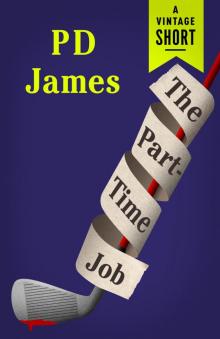 The Part-Time Job
The Part-Time Job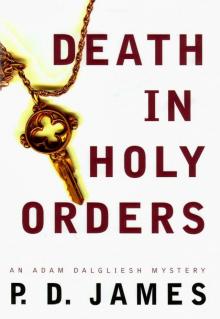 Death in Holy Orders
Death in Holy Orders The Victim
The Victim Shroud for a Nightingale
Shroud for a Nightingale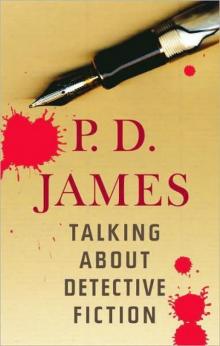 Talking about Detective Fiction
Talking about Detective Fiction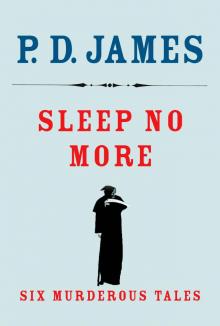 Sleep No More
Sleep No More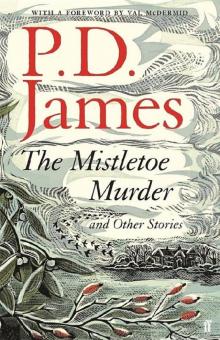 The Mistletoe Murder and Other Stories
The Mistletoe Murder and Other Stories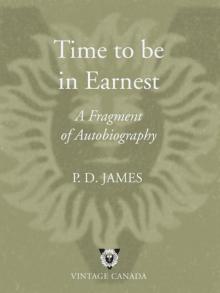 Time to Be in Earnest
Time to Be in Earnest Original Sin
Original Sin A Mind to Murder
A Mind to Murder Cover Her Face
Cover Her Face Innocent Blood
Innocent Blood Devices and Desires
Devices and Desires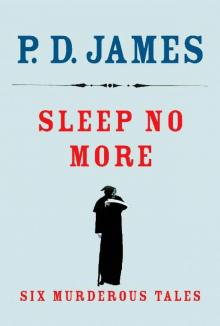 Sleep No More: Six Murderous Tales
Sleep No More: Six Murderous Tales Death Comes to Pemberley
Death Comes to Pemberley The Mistletoe Murder
The Mistletoe Murder Death of an Expert Witness
Death of an Expert Witness The Private Patient
The Private Patient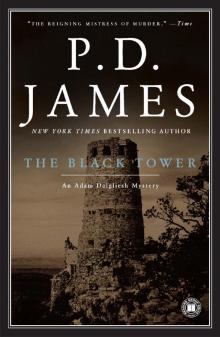 The Black Tower
The Black Tower Devices & Desires - Dalgleish 08
Devices & Desires - Dalgleish 08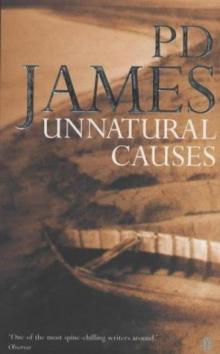 Unnatural Causes
Unnatural Causes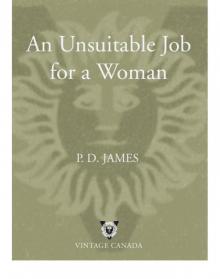 An Unsuitable Job for a Woman
An Unsuitable Job for a Woman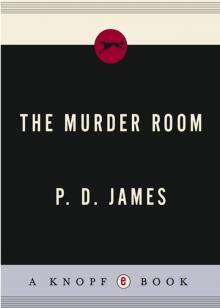 The Murder Room
The Murder Room A Certain Justice
A Certain Justice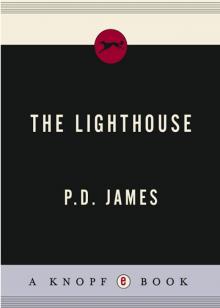 The Lighthouse
The Lighthouse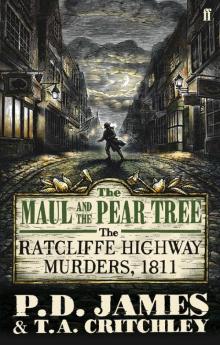 The Maul and the Pear Tree
The Maul and the Pear Tree